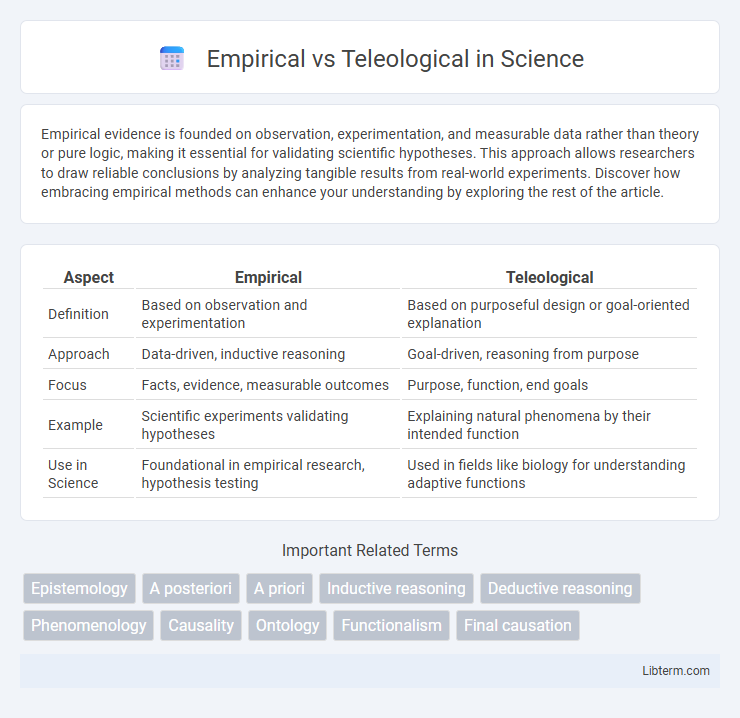Empirical evidence is founded on observation, experimentation, and measurable data rather than theory or pure logic, making it essential for validating scientific hypotheses. This approach allows researchers to draw reliable conclusions by analyzing tangible results from real-world experiments. Discover how embracing empirical methods can enhance your understanding by exploring the rest of the article.
Table of Comparison
| Aspect | Empirical | Teleological |
|---|---|---|
| Definition | Based on observation and experimentation | Based on purposeful design or goal-oriented explanation |
| Approach | Data-driven, inductive reasoning | Goal-driven, reasoning from purpose |
| Focus | Facts, evidence, measurable outcomes | Purpose, function, end goals |
| Example | Scientific experiments validating hypotheses | Explaining natural phenomena by their intended function |
| Use in Science | Foundational in empirical research, hypothesis testing | Used in fields like biology for understanding adaptive functions |
Introduction to Empirical and Teleological Approaches
Empirical approaches emphasize observation and experimentation to gather data, forming the basis for hypothesis testing and evidence-based conclusions. Teleological approaches focus on purpose and goal-oriented explanations, often considering the end results or functions that phenomena aim to achieve. Understanding these methods highlights the contrast between data-driven inquiry and value-driven reasoning in scientific and philosophical investigations.
Defining Empirical Methodology
Empirical methodology relies on observation, experimentation, and evidence collection to formulate knowledge and validate hypotheses, emphasizing sensory experience as the foundation of scientific inquiry. This approach prioritizes data-driven analysis and measurable results, ensuring objectivity and reproducibility in research processes. Empirical methods contrast with teleological approaches, which focus on purpose and design rather than observable phenomena.
Understanding Teleological Reasoning
Teleological reasoning interprets actions and events by examining their purposes or goals, emphasizing outcomes rather than solely causal relationships. This approach contrasts with empirical reasoning, which relies on observable data and experimentation to understand phenomena. Understanding teleological reasoning is essential in fields like ethics and biology, where purpose-driven explanations provide insight into behavior and natural processes.
Historical Development of Both Perspectives
Empirical perspectives evolved from the Enlightenment era's emphasis on observation and experimentation, with figures like Francis Bacon championing knowledge derived from sensory experience and scientific method. Teleological viewpoints trace back to Aristotle's philosophy, asserting that natural phenomena and human actions are directed towards inherent purposes or ends, a concept deeply embedded in medieval scholasticism. The historical development of both perspectives reflects a shift from purpose-driven explanations to evidence-based inquiry, marking a foundational divide in the philosophy of science and ethics.
Key Differences Between Empirical and Teleological Approaches
Empirical approaches rely on observation, measurement, and experimentation to gather data and derive conclusions, emphasizing evidence-based analysis. Teleological approaches focus on purpose, goals, or end results to explain phenomena, prioritizing the intended outcomes or functions over observable evidence. Key differences lie in empirical methods emphasizing factual data and testability, while teleological methods interpret events through goal-oriented explanations.
Applications in Science and Philosophy
Empirical approaches in science rely on observation and experimentation to gather data, making them fundamental in fields like physics, biology, and chemistry for developing testable hypotheses and evidence-based conclusions. Teleological methods in philosophy emphasize purpose and goal-oriented explanations, often applied in ethics, metaphysics, and evolutionary biology to understand why phenomena occur based on final causes or objectives. Combining empirical data with teleological reasoning enhances interdisciplinary studies by linking measurable outcomes with underlying purposes, thus enriching scientific investigation and philosophical analysis.
Strengths and Weaknesses of Empirical Analysis
Empirical analysis excels at providing data-driven, objective insights through observation and experimentation, ensuring conclusions are grounded in real-world evidence. Its strength lies in the ability to test hypotheses and validate theories quantitatively, enhancing reliability and reproducibility. However, empirical analysis may struggle with limitations such as measurement errors, data biases, and difficulties in capturing complex, abstract variables that are better addressed by teleological or theoretical approaches.
Pros and Cons of Teleological Explanations
Teleological explanations emphasize purpose and goal-directed processes, offering clarity in understanding complex behaviors or natural phenomena by highlighting intended outcomes. They foster intuitive reasoning and can simplify the interpretation of biological functions or social systems. However, teleological approaches may risk attributing intentionality where none exists, potentially leading to biased conclusions and hindering empirical testing.
Modern Examples in Research and Practice
Empirical research relies on observable, measurable evidence, exemplified by clinical trials in medicine where data guides treatment efficacy. Teleological approaches in practice emphasize purpose-driven outcomes, such as user experience design in technology focusing on end-user satisfaction. Modern interdisciplinary research often integrates empirical data with teleological goals to develop practical solutions, like artificial intelligence systems optimized both for performance metrics and ethical considerations.
Conclusion: Choosing the Right Approach
Empirical approaches rely on observation and data, providing concrete evidence to support conclusions, while teleological methods focus on purpose and goals to justify actions. Selecting the appropriate approach depends on the context, such as empirical methods being ideal for scientific research and teleological reasoning fitting ethical decision-making. Balancing both approaches can enhance accuracy and relevance in complex problem-solving.
Empirical Infographic

 libterm.com
libterm.com